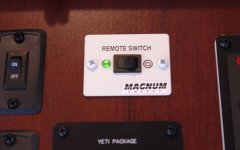Hi wryebread,
Congratulations on the new Gateway and welcome to the Heartland Owners Forum.
If by "residential size", you mean "residential refrigerator" like you would find in a home, it runs on 120V AC only. The traditional RV gas absorption refrigerator offers a choice of running on 120V AC or 12V DC plus propane.
Assuming you start a trip with the refrigerator already cold, when you unplug from shore power, there's an automatic transfer switch that will change over so the refrigerator will be powered by your trailer batteries. There's an inverter in between the batteries and transfer switch that does the voltage conversion from 12V DC to 120V AC.
If the inverter isn't already ON, you'll have to use the remote start for the inverter to turn it ON before unplugging from shore power. Then when you do unplug, the refrigerator should remain ON. Other than that, it's all pretty much automatic. Your dealer should have explained this to you when you had your pre-delivery walk through.

As for boon docking, your batteries will probably not last for more than a day without an electrical source recharging them. You'll probably want to consider either solar panels or a generator.
We have an owner-written
Residential Refrigerator Guide that provides additional information.